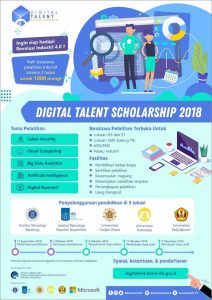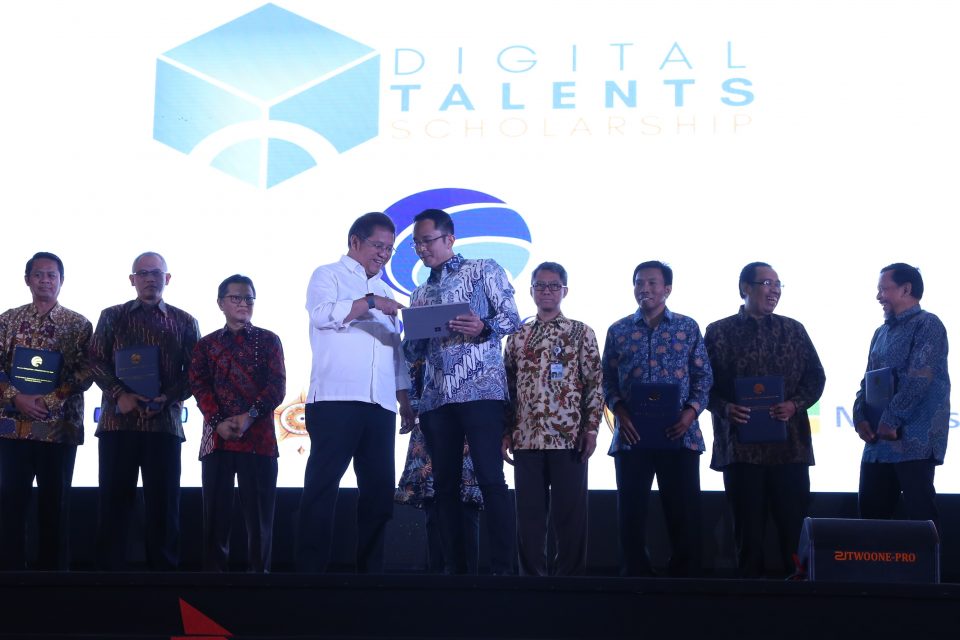In February 2018, Indonesia’s National Statistical Bureau reported that the country’s labor force had reached 133.94 million citizens – a 1.5% annual increase. But looking ahead, how can we ensure that Indonesians have the right skills to compete in the Fourth Industrial Revolution?
Educators and students already know that digital skills will be critical to career success in a future driven by technology. According to the International Communication Union (ITU), 10 million jobs that require advanced digital skills – such as data science, coding, cybersecurity, Internet of Things and mobile app development – are going unfilled because employers cannot find the right talent.
A Microsoft study with IDC in February 2018 showed that 93% of jobs in the next three years will be transformed digitally. And, 68% of jobs will be redeployed as new positions with retraining and upskilling needed. While this is a transformation and not a displacement, intensive digital education is now a fundamental item on the national agenda. Teacher competency training is also being pursued by the Ministry of Education and Culture.
“In a new world driven by technology, all youth should have the opportunity to advance their creativity, critical thinking, and problem-solving skills by learning computer science. The key enabler to this process is the educator,” said Haris Izmee, President Director of Microsoft Indonesia. “Microsoft wants to empower every person and every organization, including educators and students on the planet to achieve more.”
Digital skills are essential to boost the economy. Businesses without these skills will be left behind. Understanding this necessity, Microsoft is partnering with the Ministry of Communications and Informatics to build a #StartUpNation by leveraging technology that is harnessing Indonesia’s entrepreneurial spirit and creative human capital.
 Supported by Microsoft Indonesia certification, The Digital Talent Scholarship 2018 program is focusing on two goals: workforce skills development and future-proofing youth. The program kicked off with a three-day technology boot camp from13 – 15 September 2018 at Microsoft Indonesia office. Thirty-two lecturers from top universities in Indonesia took part, namely: Universitas Indonesia (UI), Universitas Gajah Mada (UGM), Institut Teknologi Sepuluh November Surabaya (ITS), Institut Teknologi Bandung (ITB), and Universitas Padjadjaran (UNPAD).
Supported by Microsoft Indonesia certification, The Digital Talent Scholarship 2018 program is focusing on two goals: workforce skills development and future-proofing youth. The program kicked off with a three-day technology boot camp from13 – 15 September 2018 at Microsoft Indonesia office. Thirty-two lecturers from top universities in Indonesia took part, namely: Universitas Indonesia (UI), Universitas Gajah Mada (UGM), Institut Teknologi Sepuluh November Surabaya (ITS), Institut Teknologi Bandung (ITB), and Universitas Padjadjaran (UNPAD).
The scholarship program will continue in these universities for two months through direct training in ITB, ITS, UGM, and UI, while online training on digital business will be managed by UNPAD faculty of Economics and Business.
“Together with the Ministry of Communications and Informatics, we have formulated a curriculum for training, focusing on the most essential skills that are critical for participants from technical skills, career readiness soft skills, and growth mindset,” Haris said. “We believe that the four most important aspects to focus on for this training are cybersecurity, data science, cloud server administration, and artificial intelligence.”
Haryati, Research and Development Secretary for Human Resource, in the Ministry of Communication and Information (KOMINFO), said in her opening speech that training effort would help realize the “1,000 Youth Digital Skills” program by KOMINFO. “Human Resource development is important in its support of (President) Jokowi’s aspiration to strengthen Indonesia’s ecosystem that will lead to a stronger economy. We are proud and happy to partner with Microsoft to bring the program together with the five best universities in Indonesia.”
Today, the development of cloud computing is accelerating, enabling profound progress in every field within the industry. In the “Making Indonesia 4.0” roadmap, launched by President Joko Widodo last April 2018, Indonesia will focus on improving industry innovation, with Information and Communications Technology (ICT) as one of the key sectors. Industry 4.0 is supported by five key technological advances: Internet of Things (IoT), Artificial Intelligence (AI), human-machine interface, robot and sensor technology, and 3D printing.
“As an industry player and technology company, we have the responsibility to contribute in this roadmap,” Haris added.
The 32 lecturers in the program are expected to transfer their skills and knowledge to 1,000 students from the universities to help them become future-ready for the digital workforce. In December 2018, the students will join a graduation ceremony led by President Joko Widodo, that will also mark their next journey in carrying the torch to spread their advanced digital skills to more youth in Indonesia, building Indonesia #StartUpNation by 2020. The top student will also have the opportunity to join the Microsoft Certified Professional program.
Tony Seno Hartono, National Technology Officer at Microsoft Indonesia, is one of the trainers.
To provide context, Tony explained the evolving process of the Industrial Revolution. “The First Industrial Revolution used water and steam power to mechanize production. The Second used electric power to create mass production. The Third used electronics and information technology to automate production. Now, this Fourth Industrial Revolution is building on the Third – the digital revolution that has been occurring since the middle of the last century. Digitization is more than just a change of tools or technological devices. Daily practices, workplace structures, reporting relationships, information sharing, customer interaction, and even competition are also transformed. This disruption is changing the way we live, work, and play.”
“The growth of start-ups and unicorns in Indonesia is one of the keys that drive the digital economy in Indonesia. To balance this growth and to meet the demand in digitally-skilled human resources, we need this kind of initiative to bring tangible impact for our workforce,” said Haryati.
As we move toward 2021, we must expect that the digital transformation momentum to accelerate rapidly with more companies investing in big data, AI, IoT, and other digital transformation enablers. By then, 40% of total Indonesia’s GDP (and 48% of SEA’s GDP) is expected to be derived from digital products and services. Therefore, having a digitally-skilled workforce will be imperative for Indonesia to cope in the new era.
A Digital Innovation Summit was also held on Friday, September 21, 2018, at Graha Sanusi Hardjadinata, Universitas Padjajaran which also marked the launch of Digital Talent Scholarship 2018. The event was opened with a speech by the Minister of Communication and Information Rudiantara who explained what the next generation needs to embrace digital revolution 4.0. “Our human resources development is still way behind the technology progress and development,” he said. The Ministry of Communication and Informatics sees the need to push the quality of youth in the fields that are most needed by labor recruiters today.
The event included a digital signing ceremony by the minister using a Microsoft Surface device that was handed over by Microsoft Indonesia President Director Haris Izmee.
For more than 23 years, Microsoft has had a long commitment to transforming education, particularly in shaping the digital and soft skills of youths in Indonesia. The launch of Generasi Bisa!, a platform powered by Microsoft and developed by YCAB Foundation is amongst the initiatives. The features in Generasi Bisa!, a platform to connect potential employers with students, ranging from courses, mentoring programs, job vacancies, to career articles. Microsoft has also supported Universitas Indonesia and Universitas Gajah Mada in their research, by utilizing Microsoft technology.





